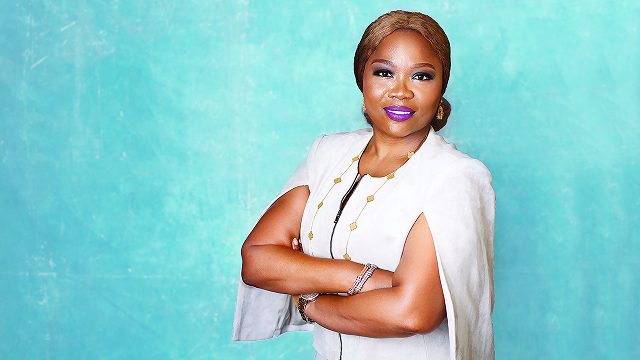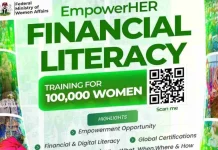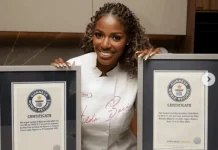Mrs. Temitope ‘Tope’ Iluyemi, is the Director, Global Government Relations for Africa at P&G. Following a short career as a Pharmacist, Temitope joined P&G Nigeria in 1998 as an Account Executive in the Sales function. Since then, she has held several roles across various functions in the organisation.
In 2010, she joined External Relations, which she led for Greater West Africa (14 countries in West Africa) leading P&G’s expansion into these countries. In 2017, following a two-year assignment in Washington D.C USA, Temitope’s Government Relations role was expanded to include Northwest Africa and today spans across 54countries in Africa.
In her current role as Government Relations Director, she is responsible for improving P&G’s investment viability across the region, advocating for policy reforms that enable P&G’s business operations including deepening Africa’s integration, building P&G’s reputation across the countries with a P&G reach and supporting company communications for Nigeria. She is highly sought after as a key contributor to development solutions in the Africa region.
Tope is a member of the Pharmaceutical Society of Nigeria, sits on the board of directors for P&G Nigeria, Chairs the taskforce on trade facilitation at the US Chamber of Commerce, sits on the taskforce on Regional Integration at the NESG and is involved in various local community projects.
The top woman at P&G takes GuardianWoman through her career trajectory, her thoughts on gender disparity, how to Balance For Better and challenges of being the only woman in the boardroom.
How has your journey been so far in the corporate world?
I feel truly blessed in my career so far and still working hard on this journey. I have been privileged and exposed to development opportunities and experiences that you simply can’t buy! After qualifying as a pharmacist, I worked in the industry for a couple of years and was fortunate enough to join P&G shortly after.
Like many young graduates, my dream was to join a big multinational company, learn and move on. I believed this was also going to be my journey in P&G!
I joined as a Sales Executive and within a year, quickly rose to my first International assignment in West Africa located in Lomé, where I had the mandate to expand P&G’s distributor operations into French West Africa.
I soon moved into a bigger market in Ghana where I opened distributor branches, building distributor capability and expanding P&G operations in West Africa’s 2nd largest market.
By the end of my second year, I was transferred to our South Africa operations which was tough for a young black female at the time – and where, there were very few women. (To note, I was the first female Sales Manager employed in P&G Nigeria).
With support from my family and particularly my husband and the very special favour of God (not to mention good old-fashioned hardwork and grit against all odds) I rose over my 7-year stint in South Africa to become a senior manager in charge of the biggest national account in South Africa – having worked across virtually every sector. To date, I still consider this period, my time of greatest learning, challenges and personal development of my career.
After this very interesting period, the company asked me to lead a different organization and I was appointed as the Supply Chain Group manager for West Africa – with all our bold ambition of expansion into West Africa.
This was another very stretching assignment with a sharp learning curve as it was a different skill to what I had used in the last seven years of my career – albeit a very rewarding experience as it made me a more rounded business leader.
Following my experience in the supply chain operations, the business had another need and a new assignment was proposed to me in External Relations. Never one to turn down a new experience, I embraced it with the same gusto I put into everything my hand finds to do, combining the 3H- head, heart and hands in everything.
As External Relations Group Manager, I went from managing West Africa to becoming Director for Sub Sahara Africa and finally as Africa lead.
In my career, I have been blessed to have different types of managers (I would like to say they were all good), however, several were outstanding and advised, critiqued and supported me when I wasn’t there. I am where I am here today because I stood on the shoulders of these giants.
I am also fortunate to be in a company that values women and has workplace policies that recognise our different life’s stages with programs to support them and help you continue to thrive.
The 2019 International Women’s day had the theme, Balance for Better, what is required to ensure that gender balance is accomplished in the workplace?
There couldn’t have been a better theme for this journey on gender parity. I believe that organisations need to be more deliberate and intentional about achieving gender balance in the work place. When we break down aggregates and deep-dive into what is needed to bridge the gap, it’s not as difficult as we imagine.
For example, at P&G, we aspire to build a better world for all of us – inside and outside of the organisation, a world free from gender bias and a world with equal representation and an equal voice for men and women.
We are deliberate about hiring women into our management roles and they are promoted into next assignments at the same progression as men. We strive to achieve equal gender representation in all parts of our company and ensure an inclusive environment where everyone – men and women – can contribute to their full potential. And this cuts across all spheres including recruitment, selection, pay packages and promotions.
P&G Nigeria’s leadership has about 50 per cent women representation; a deliberate strategy to recruit women and men in equal numbers at hiring with clear development plans unrelated to gender.
Finally, we need to change the narrative by broadening our definition of leadership from current male stereotypes that do little to serve both men and women to be more inclusive. For instance, expression of confidence can be replaced with the word “humility, empathy and inclusion. Humility is cited among the top leadership qualities in today’s world.
Are there certain challenges that you have faced as a woman in your climb up the corporate ladder?
Ours is a company that is governed responsibly and behaves ethically; that is open and transparent in its business dealings; and provides an appealing place to work where our employees are treated fairly and given the opportunity to be the best they can be. We make career decisions based solely on performance and is unrelated to gender, race or ethnicity.
However, company policies are only as good as the people applying them. Many managers are not coached on some of the landmines to navigate for successful gender representation and productivity. This is why I encourage women to be well-informed and take part in the shaping of their destinies.
Did you ever have to make a choice between career and family?
I have been blessed to work in a company that sees me as a whole person with many parts, so it’s not an ‘or’ but an ‘and’ & ‘plus’. To contribute my best to the company, all parts of the whole must be coordinated and working well.
As such, it is not a choice. I have two beautiful children and I worked through it all and my career continued to progress and I’m proud of their young achievements. We believe that the interest of the individual and that of the company are inseparable. A well-balanced and secure individual will always deliver their best.
Earlier on I talked about moving back to Nigeria to take a leadership role in a different function of supply chain. This was borne out of my need to meet certain family obligations at that time.
The company listened, I got my requested transfer and a role in which I grew and made significant impact. Every step I take has to work for all the parts that make me who I am – otherwise it isn’t happening.
My priorities are clear for me, and that is my family- they remain long after the work is gone. In life, our priorities also change depending on the season.
The important thing is that you be very clear on what type of support you need at every life stage, having crossed off certain basics of performance. You need to be flexible and adaptable. This is one personality trait I believe has helped me through my journey and still works for me to support my family needs at every season. There are no absolutes and I look for the opportunities in every situation.
P&G recently took part in the #WeSeeEqual Summit in Mumbai, India, what was the major narrative at the summit?
The company announced a new commitment around a number of initiatives that will promote gender equality across the Indian Subcontinent, Middle East and Africa (IMEA) region. The declaration is part of the company’s citizenship focus on being a Force for Good and Force for Growth.
Over the next three years, the company aims to spend $100 million on deliberately working with Women-Owned Businesses in IMEA. We will also educate more than 23 million adolescent girls on puberty and hygiene across IMEA.
P&G and its brands will use the company’s voice in forums such as the #WeSeeEqual Summit, brand advertising like Ariel, Always & Gillette and multi-stakeholder efforts to spark conversation and motivate change.
Are there times when you have felt intimidated about being the only woman in the boardroom?
Maybe I wouldn’t use the same word at this stage, but it certainly feels lonely and often challenging to be the only woman in the room. In almost all my careers to date, I’ve often been in male-dominated environments – Sales, Supply Chain and Government Relations.
However, with continued self-development, any feelings of intimidation only lasts as long as I notice it. I start to think: how will I change this narrative? I consider how to turn the challenges of being the only female in the room to an advantage. I change the stories I tell myself about the representation in the room and even am amazed what magic can happen as a result! The only thing that stops us is fear of how others will react to us, or our ideas.
Once we can conquer self and understand the dynamics of the room, everything else looks “effortless”. If I have something to say, I keep standing until I am heard. This is something I learnt from mentors. I encourage everyone to speak to someone credible, who they can bounce these ideas and issues off.
I once had to moderate a panel on an international platform and this gentleman in the audience, rather than focus on the panelist topic, directed his comments at me, essentially putting me on a weighing scale to find out what I knew, what made me qualified to be in my position.
My calm and deliberate response earned an applause from the audience, while most people saw through the ruse as several came to tell me after the panel.
Do you think a time will come when there will be no form of discrimination against women?
We have come a long way on this journey and should acknowledge the progress we have made while there is still much to do.
When I lived in Washington DC, the national archives was right outside my office. I visited one day and walked through the archives. I immersed myself in the journey of many women who had gone ahead to pave the way for women like me to be in positions as I am today. I felt humbled and thought about their grit, courage and sacrifice.
We must not forget these and there are several examples at home including the likes of Funmilayo Ransome Kuti, Queen Aminat, Margaret Ekpo… to name a few. We must not forget how far we have come as it is fuel for future growth.
After all, there was a time women could not vote! (Imagine that). I believe that as long as we sustain the vision of an equal world free of gender bias, we will make progress and it will continue to get better balance. We owe this to our daughters and generations unborn. We have many male advocates in this regard.
This is where I call on policy makers to institutionalise change. Several cultural practices that hold back the girl child (promoting girls education, abolition of child marriage, even legislating into normalcy, the preference to keep your maiden name after marriage, I believe will encourage more fathers to develop their daughters, send them to school with pride that they will ‘carry his family name’ to glory. It all lies in adapting our social orientation and consciousness. We can continue to make progress towards achieving balance.
With all the numerous initiatives P&G has championed globally to promote gender equality, how are these programmes being implemented in Nigeria?
Our company is a leading light in promoting gender parity and seeking ways to walk the talk. We are leveraging our insights to uncover gender bias and taking actions to spark conversations and motivate change. We are doing this through our brands, with our corporate voice, and with our people inside and outside of our company.
Our gender equality effort is integrated into our business, and we are focused on areas where we can have the greatest impact: Leveraging our voice in advertising and media to tackle gender bias issues through our brands e.g. Always #LikeA Girl and Ariel #ShareTheLoad campaigns; removing gender-biased barriers to education for girls and economic opportunities for women.
We’re doing this through our brand and corporate programs and policy advocacy efforts; Always Keeping Girls in School program in Nigeria and South Africa, Always UNESCO program in Nigeria which reaches over 110, 000 with basic literacy and vocational skills training; our P&G Children’s Safe Drinking Water where we’ve delivered over 240 million liters of clean drinking water across the country and our current partnership with UNWomen which provides financial skills training for women in Kaduna state; women-owned business training and mentorship through our women entrepreneur development program in partnership with WEConnect.
P&G is committed to achieving equal gender representation in all parts of our company and ensuring an inclusive environment where everyone – men and women – can contribute to their full potential.
In your opinion, what is required to achieve a gender equal corporate environment?
To achieve a gender equal corporate environment, organisations must first make a deliberate effort to tackle unconscious biases and strive for equal representation for women and men at all levels.
Building an inclusive culture where everyone can contribute to his or her full potential is also very important. There must be workplace policies that address and support different life stages of women and men, including creating awareness on social issues like workplace violence or what constitutes harassment.
Lastly, we need to all make a conscious effort to burst the myths around gender parity and change the narrative to enable women contribute their best to the economy and nation building.
What are your key beliefs?
Whatever your hands find to do, do it exceptionally well- there is no substitute for excellence. It is a trait I learnt from my very strict mother who is still energetic and impacting lives in her 7th decade. Be genuine and treat others as you would like to be treated- a trait I learnt from my Dad who embodies humility for all his achievements. Chart your own path. Carve out your destiny, don’t be a by-stander on issues that affect you. I love being me!
Source: THISDAY












